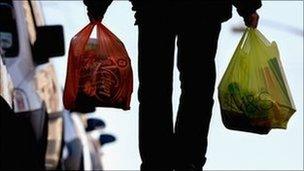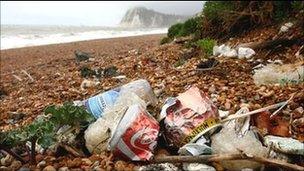Dealing with the baggage of a taxing problem
- Published

A charge on plastic bags is due to be introduced in Northern Ireland in 2013
It's become something of an environmental mantra these days. Tax plastic bags.
And if it sorts out what is perceived to be a major littering problem, why not?
Charge for a bag that is usually given away free and the plastic litter problem should disappear.
The views of the Northern Ireland public have recently been sought as to how much they should be charged per bag.
Wales has started charging 5p a bag.
Paying for plastic bags has been mandatory for years across the border in the Republic of Ireland.
As a result you will not see many plastic bags lying about there.
Just how big a problem are plastic bags in Northern Ireland?
Rubbish
To investigate the matter further I walked along a beach on the east coast at a place called Millisle.
A magnet for weekenders and summer visitors alike, the beach is often cluttered with general picnic and fast food rubbish, including plastic bags.
However, even after a careful search of several hundred metres of beach at low tide, only half a dozen bags were located, some half buried in the sand.
The beach still had lots of plastic lying on it, and some of it was in the shape of plastic bags, but not the type that would be taxed.
These bags were the wrappings you tear off a product or food item.
There were plastic trays, tattered blocks of insulation, bits of plastic plumping, plastic boxes, lots of plastic bottles and endless bits of plastic cord and rope.
In fact, I found enough plastic debris in the same area to manufacture literally hundreds of plastic bags.
But just six plastic bags of the taxable type.
Perhaps the lack of bags was due to the wind blowing them away.
So I decided to search elsewhere.
Along a nearby road the wide grass verge had been cut, exposing a pile of plastic litter.
I found three plastic bags of the type that would attract tax.
There was some black plastic left over from silage making and over 50 plastic drinks bottles.
Tax
But the reality was that there were very few "single use" plastic bags.
So just how much taxable plastic bag litter is there out there?
My exploration to date was hardly scientific.
However, figures from the Department of the Environment reveal that plastic bags make up less than 1% of visible litter and are under 5% of all plastic packaging used.
What's more, up to 80% of plastic bags are being used more than once, depending on which statistics you choose to believe.
Most end up being re-used as a bin liner.
Then there is the much vaunted argument that their very existence is bad for the environment.
The UK's Environment Agency carried out a study of plastic bag life cycles.
Depending on how they are used, and their potential effect on global warming, the reality is very different from what is generally imagined.
If you used the ubiquitous plastic shopping bag just once, you'd have to use a paper bag three times to match the global warming potential.
Yes, it actually is more damaging to global warming to make and dispose of a paper bag compared to a plastic one (UK Environment Agency, 2011).
And you'd need to use a heavy duty plastic bag 11 times and a cotton long-life bag 131 times before matching a single-use plastic bag, in terms of the global warming potential.
Research
If you re-use the plastic bag just once (even as a bin liner) the arguments become even more interesting (and surveys suggest that the majority of plastic bags actually do get used more than once).
According to the Environment Agency's research, you'd have to use a paper bag seven times - an unlikely occurrence.
That is just to match the global warming potential of the plastic bag used twice.

Many types of plastic end up discarded on our beaches
A heavy duty plastic bag would need to be used 26 times and a cotton bag used 327 times before becoming more beneficial than a plastic bag used twice.
Ironically, research shows that the cotton bag is used on average just 51 times before being discarded.
That actually makes it over three times worse for the environment, compared to the humble plastic bag being used just once.
When the tax or charge is introduced into Northern Ireland, the plan is to use the money it raises to fund a series of environment initiatives, the "Green New Deal".
Before this approach was suggested, the initiatives were to be funded conventionally by government.
Now the funding and survival depends on how well the bag tax does.
So what is the message to consumers?
Plastic debris
Use more bags, pollute the environment and help the green initiatives, or use fewer bags, save the environment but leave no money for green initiatives?
Plastic debris is more than just a visual waste problem.
It kills millions of animals across the world each year.
Curiously plastic bags are not the main villain - they are not even one of the minor players.
A government source reports that 96% of dead North Sea fulmars (seabird) were found to have bits of plastic in their stomach.
None were reported to have any contact with a plastic bag or to be tangled in one.
Plastic bags seldom kill animals, but general plastic debris kills animals by the million.
One of Greenpeace's top scientists claims that the plastic bag issue has been distorted by confusion and hysteria.
"It's very unlikely that many animals are killed by plastic bags," said Greenpeace's marine biologist David Santillo.
"The evidence shows just the opposite. We are not going to solve the problem of waste by focusing on plastic bags."
Plastic bags do annoy people.
There will always be locations, especially in, or near urban locations, where the bags proliferate and get trapped in the windy canyons of alleyways and hedges.
But often they are only a small part of litter in the same area.
A number of objective surveys have tended to come to this conclusion.
Perhaps we are taxing the wrong plastic debris.
It is easier to recycle plastic bottles than plastic bags, yet we throw away a staggering amount of plastic bottles even though facilities are already in place to collect them.
Other European states use a plastic bottle deposit scheme to encourage their re-use.
Northern Ireland throws away the majority of its plastic bottles.
And what of the litter situation in the Republic of Ireland, who were the first to introduce a plastic bag tax?
I recently walked a beach in County Clare - not a plastic bag in sight.
But there was just as much plastic rubbish as on the average beach in Northern Ireland.
It included the usual plastic bottles, plastic drums, lots and lots of string, bits of rope, fishing nets, rubber gloves and endless domestic plastic detritus including lots of non-taxable plastic bags.
There was even a refrigerator and the usual scattering of car tyres, but no plastic bags.
So the "taxing plastic bags argument" isn't quite as straightforward as it seems.
Some say it could take the focus away from the real problem, that we simply create too much plastic waste in the first place.
Most of the plastic bags and bits of wrapping we throw away are not the stuff we plan to tax.
But they make up the vast majority of plastic waste we see every day.
All of which suggests you can't just "tax away" plastic rubbish.
There is a bit more to it than that.
- Published8 September 2011
- Published20 July 2011